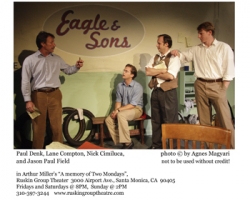In its new production, A Memory of Two Mondays, by Arthur Miller, the Ruskin Group Theatre brings a slice of the past to life. The story takes place over two Mondays and depicts the working lives of people trying to eke out a living at an automobile parts store during the Great Depression. Despite hardship, loss and goodbyes, the work continues, as there are constantly new orders to fill and new parts to find.
Director Amelia Mulkey tries to emphasize this continuum in several places, with a chorus of rhythmic noises provided by the cast. A wedding ring being tapped against a coffee mug, for example, as they go about their duties. While each character keeps his/her own noise to a set beat, they never come together in harmony, leaving the audience sitting in a cacophony of noise, which serves to delineate each character as an individual working for his/her own purposes and unaware of the lives of others.
However, as written in the program, Miller is quoted as saying, “There were two occasions when Americans lived through a common experience … the Civil War and the Great Depression, that is, when everybody was in the same boat … and perhaps we understood each other a little bit better then.” With that sentiment in mind, it would have been nice and might have made more of an impact if the cacophony would have fallen into sync at some point, as the individuals worked together despite their separate goals.
The cast was solid and worked well together as an ensemble to create this world. Lane Compton, as Bert the innocuous young man with aspirations of college, did an excellent job as the odd man out. His innocence and optimism, whether peering out the filthy windows or leaving for college, set him apart from the rest of the working stiffs. Conor Walshe, as Tom Kelly, also did a fabulous job, portraying a rehabilitated drunk, leaving the audience calling on “willpower” as they left the theater.
However, the standout performance belonged to Richard Leighton as Gus. Leighton takes the audience on a journey that starts with a larger-than-life partier who stays out all weekend despite his ailing wife back home, to a broken down man with nothing left to live for. His choices are big and bold, and the audience hangs on his every word for his efforts.
A Memory of Two Mondays isn’t the happiest of plays (would you expect anything else from Miller), but Ruskin delivers a solid production.

